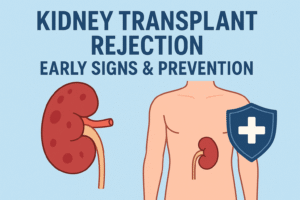Kidneys are the vital organs to keep the body healthy. The kidneys are responsible for filtering waste, maintaining balance of fluid, and regulating blood pressure. Adopting some lifestyle choices can have a profound impact on kidney function and prevent problems.
Stay Hydrated
Inadequate hydration can lead to poor kidney health. Adequate hydration enables the kidneys to effectively filter waste and maintain optimal fluid balance. That is prayerfully enough fluids daily to support optimal kidney function.
Maintain a Balanced Diet
Diet The focus should be on a diet full of fruits, vegetables, whole grains, and lean proteins, which can help keep the kidneys healthy. Reducing the intake of processed foods, high-sodium products and excess protein can lessen the burden on the kidneys. These include foods that are beneficial to the kidneys, such as berries, apples, cauliflower, and bell peppers.
Exercise Regularly
Regular exercise regulates blood pressure and blood glucose levels—both important for kidney health. For overall well-being, try to get in at least 150 minutes of moderate-intensity exercise each week.
Manage Blood Pressure
Over time, high blood pressure can harm the kidneys. Alarmingly, those with kidney issues often overlook this by failing to proactively monitor and manage their blood pressure. Healthy lifestyle choices, like eating less sodium and exercising regularly, can afford protection against diminished kidney function.
Control Blood Sugar Levels
Blood sugar levels must be maintained in diabetics if kidney damage is to be avoided. Eating healthily, exercising regularly, and complying with medical advice can help control blood sugar.
Avoid Smoking
Smoking speeds up kidney damage and makes you more likely to develop kidney disease. This can promote healthy kidneys and enhance overall health.
Limit Alcohol Consumption
Overconsumption of alcohol can have detrimental effects on the kidneys. Keeping alcohol intake moderate can prevent kidney disease.
Watch Over-the-Counter Meds
Overuse of nonsteroidal anti-inflammatory drugs (NSAIDs) such as ibuprofen can lead to kidney damage. Minimize use of such medications; contact a health care professional if you have concerns.
Maintain a Healthy Weight
Obesity is a risk factor for kidney disease. Following a healthy diet and exercising to reach and maintain a healthy weight can decrease this risk.
Regular Health Check-ups
Early detection of kidney problems is possible through regular check-ups with healthcare providers. Regular tests can keep an eye on kidney function and help for timely interventions if needed.
However, adopting these habits can really help your kidneys, as well as a whole range of other things. If you want more individual advice and kidney management, then speak to the healthcare providers at Southern Oklahoma Kidney Center.




